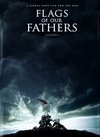Flags of our Fathers Review
By Joe Lozito
"Flag" Praising
At a time when the line between right and wrong - good and evil - have never seemed more blurry, "Flags of our Fathers" - Clint Eastwood's masterfully-crafted story about the truth behind the iconic photo of the flag-raising at Iwo Jima - couldn't be more resonant. The script by Paul Haggis and William Broyles Jr., based on the book by James Bradley and Ron Power, makes great use of non-linear storytelling, jumping between the flag-raising itself and the resulting publicity tour, during which the three surviving soldiers are trotted out in front of audiences desperate for hope. The war had left the American government on the brink of bankruptcy - printing money to the point of devaluation - so this tour became a perfect venue to sell war bonds to raise money for the manufacture of weaponry. But since the photo was actually taken during a
second flag-raising on that fateful day (after the first flag was pulled down for reasons I'll let the film explain), these soldiers don't feel like they belong on parade. They don't feel like heroes.
The script deftly introduces its characters over the course of the film as each man takes on a significance in the story. Ryan Phillippe gives a performance of surprising depth as John Bradley, one of the three heroes forced to take the credit they feel is undeserved. Jesse Bradford is also memorable as Rene Gagnon, perhaps the only one of the three that takes some enjoyment out of their new-found status. Ira Hayes (played with reverence Adam Beach), the native American soldier in the group, is particularly conflicted, driven to bouts of alcoholism. Robert Patrick, Neal McDonough and war-movie-mainstay Barry Pepper also fill out the ranks of Mr. Eastwood's story (though I can't completely support the casting of Paul Walker).
The battle scenes in the film are nothing short of astonishing, featuring some of Mr. Eastwood's most ferocious direction. Who would have thought the man behind such intimate portraits as "The Bridges of Madison County" and "A Perfect World" would be equally at home on the canvas of digital imagery. The flawless special effects - fleets of ships stretching to the horizon, fighter planes storming a mountain - are breathtaking without ever being showy. Mr. Eastwood commands this new medium with a heretofore unseen confidence.
But it's this same grandeur that eventually scuttles "Flags". While Mr. Eastwood keeps the pace brisk and the dialogue snappy, the film doesn't know when to end. Mr. Haggis' seeming need to follow his characters to their logical conclusion and beyond is admirable, but this was not a movie about characters, it was about an idea - it was about a moment in time. And as such it was brilliant. But "Flags" extends far beyond that moment, getting caught up in a few too many voice-overs. It misses the intimacy that made
"Unforgiven" and
"Million Dollar Baby" so unforgettable.
Mr. Eastwood has always gravitated towards characters and films the deal with shades of gray. In war, the film says, "there are no heroes and villains, no good and evil". As staged by Mr. Eastwood, The Battle of Iwo Jima is utter chaos - a constant barrage of explosions and flying debris. The bar has, again, been dutifully raised. The scenes invite inevitable comparison to "Saving Private Ryan" whose famed director is a co-producer on "Flags". While Steven Spielberg's masterpiece still packs a wallop, those opening twenty minutes had a very linear feel to them - storm the beach, take out the enemy bunkers, stop. In "Flags", there is never a feeling of safety, never a feeling of closure. And it's that sense that permeates the film. A sense that war once waged never really leaves us. It seems as our understanding of war gets more personal and more complex, so do our war movies.
